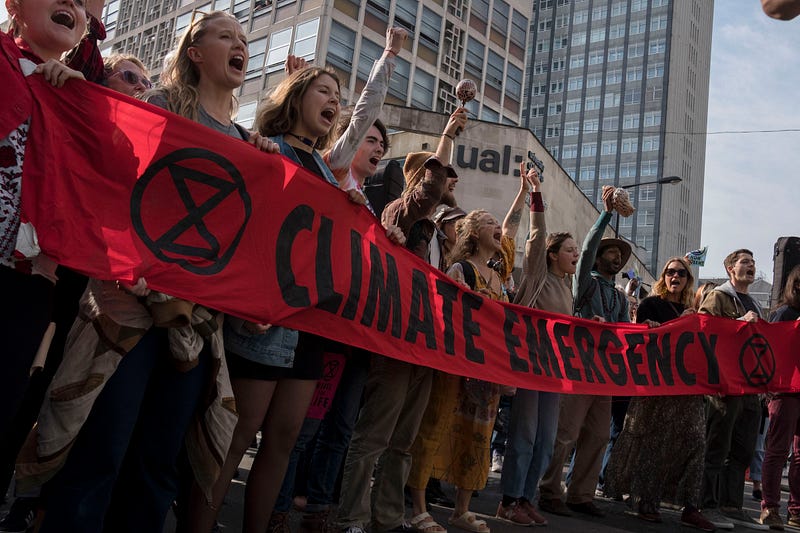The Urgent Need to Preserve Biodiversity for Future Generations
Written on
Chapter 1: The Biodiversity Crisis
We stand on the brink of a catastrophic decline in biodiversity, a decline that threatens the very foundations of human existence. Alarmingly, our response to this imminent crisis lacks the necessary urgency.

An Extinction Rebellion demonstration took place on April 18, 2019, in London, emphasizing the urgent call for action against climate change.
According to a recent United Nations report, human activities are pushing over 1 million plant and animal species toward extinction in the coming decades. The report ominously notes that “serious repercussions for people worldwide are now probable.” Robert Watson, the British scientist who led the report, articulated the threat: “We are indeed jeopardizing our food security, water security, human health, and social structure.”
In simpler terms, we are extinguishing the very life forms that sustain us. If we do not act swiftly to alter our behaviors, the stability of our existence will become ever more uncertain. Biodiversity encompasses all life on our planet, from majestic blue whales to the smallest insects. It includes not only the fish and mammals we consume but also the plant life that safeguards our waterways, along with the unseen microorganisms essential for the planet's health. Human actions such as industrial farming and urban development are putting numerous species at greater risk, leading to their potential demise in just a few decades. This crisis is compounded by climate change, which exacerbates the damage done to our ecosystems. As highlighted by The Post’s Darryl Fears, “The warming climate significantly worsens the impacts of overfishing, extensive pesticide application, pollution, and urban sprawl into natural habitats,” all of which contribute to the decline of unique life forms.
However, the report emphasizes that this predicted wave of biodiversity loss is not a foregone conclusion. We still have the opportunity to avert much, if not all, of this devastation. Current economic structures often incentivize practices that harm nature, but with the right governmental and financial policies, we could discourage actions leading to species extinction while promoting sustainable initiatives.
The U.N. report underscores that this is a global crisis, with the United States being a significant contributor. As the leading global power, it is our responsibility to take the lead in setting a positive example. If we fail to do what is right, what hope do we have that others will follow suit?
Yet, there are considerable challenges ahead. The Trump administration has been actively working to ensure a grim future by denying the reality of climate change, withdrawing from the Paris climate agreement, and attempting to relax stringent auto emissions regulations. Its approach to the dangers facing our planet’s species is equally troubling, as it seeks to dismantle critical provisions of the Endangered Species Act. Funding for the enforcement of this act has been drastically reduced, with further cuts proposed. These policies are often supported by large corporations eager to eliminate regulations that hinder short-term gains. However, the electorate also plays a role in this dilemma. While Americans express a commitment to environmental protection, they simultaneously advocate for economic growth.
Many of these attitudes are fueled by a collective sense of fatigue. Although millennials rally around concepts like the Green New Deal, which addresses many issues highlighted in the recent report, many older generations remain skeptical of the urgency required. When politicians from either party mock or dismiss the Green New Deal, they increase the likelihood of a bleak future.
Human nature tends to focus on immediate concerns, often at the expense of future well-being. We are reluctant to make sacrifices for ourselves and even less so for generations yet to come. However, if we neglect to protect the biodiversity of our planet, we risk dismantling our economy as survival becomes increasingly difficult for many. To ignore the pressing need for meaningful action is to show disregard for the future—a grave disservice to humanity, particularly to our children and grandchildren who will inherit the consequences of our inaction.
Helaine Olen is a contributor to Post Opinions and author of "Pound Foolish: Exposing the Dark Side of the Personal Finance Industry." Her work has been featured in publications such as Slate, The Nation, The New York Times, and The Atlantic. She is a member of the advisory board for the Economic Hardship Reporting Project. Follow her on Twitter @helaineolen.
Chapter 2: Can We Prevent the Sixth Mass Extinction?
The first video titled "Can we stop the sixth mass extinction?" explores the ongoing biodiversity crisis and the urgent measures needed to combat it.
Chapter 3: The Consequences of Inaction
The second video, "Extinction Is Forever - Biodiversity Is Collapsing," delves into the irreversible impacts of biodiversity loss and why immediate action is critical.